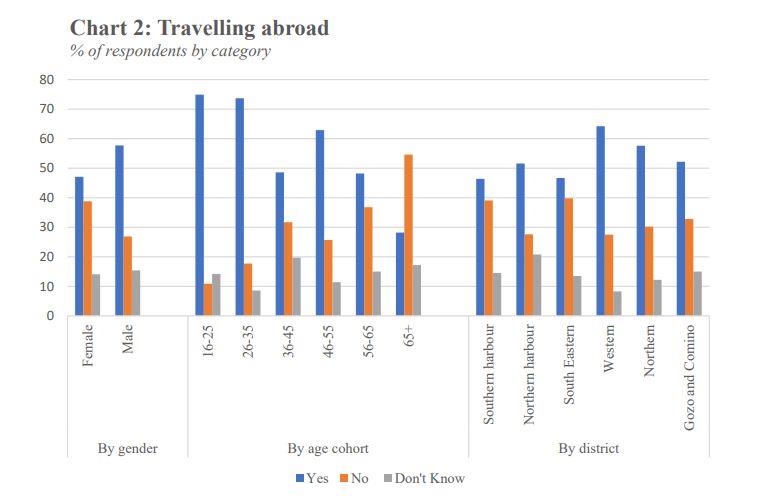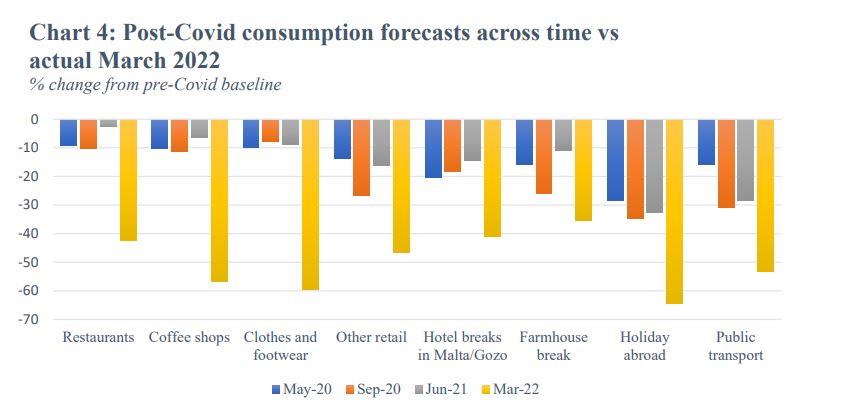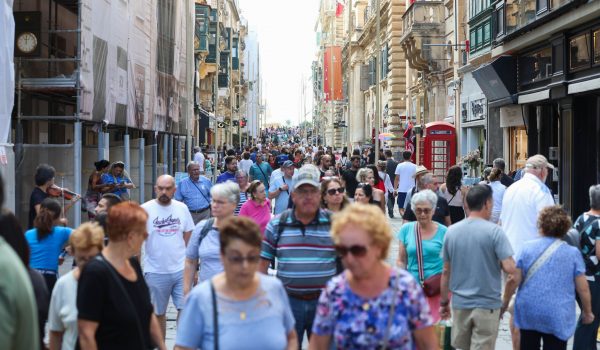
A survey carried out with 600 people found that there is ‘no support’ for mandatory vaccinations, and that consumers are consuming less than was expected.
The survey was conducted by statistician Vince Marmara and Sagalytics, with the questionnaire having been jointly designed by Sagalytics and the Office of Joseph Muscat. Respondents were “randomly selected out of Malta’s population aged 16 and over.”
The Economic Note summarising the main findings found that around 88% of the respondents are fully vaccinated with three shots against Covid-19, while 97% of the population has at least two vaccine shots. While this shows that the vast majority are willing to get vaccinated against the virus, the survey found that there is “no support” for mandatory vaccination.
68% of respondents believe that there should be no legal obligation for getting vaccinated, it found. These figures are mainly driven by the 25-34 cohort, with 92% believing that everyone should be free to choose whether to get vaccinated. “This cohort together with the 16-24 age group, is also categorised by the highest proportion of respondents who have not taken at least two vaccine shots, standing at around 8% of the respective age group, more than double that of the rest of the Maltese population.”
“Respondents are also quite unsure whether they would opt to receive an annual Covid-19 vaccine, with only half of the population responding positively, mirroring the actual take-up rates for the influenza vaccine. This suggests that the Maltese population is increasingly viewing the Covid-19 pandemic as a normal annual recurrent infection.”
Despite the high vaccination rates and exceptionally high efficacy rates of the vaccines on offer, less than half of the respondents believe that their life will return to a pre-pandemic normal. “There is however a considerable degree of uncertainty in these figures since around 20% of respondents are still unable to determine whether normalcy will ever be achieved even after vaccination,” it reads.
In addition, “there is no clear consensus on whether quarantine rules for positive cases ought to be relaxed.” 31.7% say things should remain the same, 33.1% believe it should be shortened for people with the booster dose and 35.1% believe it should be shortened for everyone.
It goes on to read that the results do show there is a majority who believe that quarantine rules should be relaxed for contacts of Covid-19 cases. On this issue, 26.3% believe the quarantine should remain the same, 30.8% believe it should be shortened for people with a booster dose, and 42.8% believe it should be shortened for everyone.

People more willing to travel
“Against the backdrop of a continued sense of uncertainty surrounding the return or otherwise towards a normal way of living, it is interesting to note the considerable optimism held by Maltese respondents when it comes to their willingness to go abroad this summer.”
The survey found that 52% of respondents reported that they are willing to go on holiday abroad this summer. 33% answered that they are not planning to holiday in a foreign country for this year. “This result contrasts sharply with the one that published in the latest survey, where only 21% responded positively when asked if they were planning to go on holiday.”
The survey found that for those aged 16-35, the proportion of respondents intending to spend their holidays in a foreign country reaches almost 80%. This drops for the 36-45 age cohort and continues to decline considerably with older age groups. The 65+ cohort is the only age group which is on average still markedly against travelling abroad for holidays.
“One can see that the extent of the upward revisions in the intention to travel abroad when compared to July 2021 is considerably negatively related with age. This in turn suggests, that upward revisions in the intention to holiday abroad are mainly driven by a re-assessment of the health risks associated with travelling which has been undertaken by the age categories that are least at risk of developing complications arising from Covid-19 infections.”
Economic situation
Turning to the economic aspect of the situation, the results “again point at online shopping as a development that is most likely here to stay, even after the pandemic.” It found that this is especially the case for take away foods, groceries and daily needs. These categories in particular saw an increase of around 9% in online shopping when compared to before the Covid-19 pandemic, the survey found.
“Still, the willingness to continue using online platforms for shopping seems to have waned out slightly when compared to the latest study published in July 2021.”
The Economic Note explains that National Accounts data shows that spending on clothing is still 15% below pre-pandemic levels. “On the other hand, in an environment of rising food prices, it is unlikely that consumers could expect spending less on food. Therefore, one needs to interpret some results in light of broader trends that have emerged in recent months, mostly those relating to the inflationary pressures created by the war in Ukraine.”

Consumption levels
Consumption trends have also been affected.
“The most striking result that emerges from this survey is the reversal in the positive trends in consumption expectations. Respondents have indicated that their consumption frequency is still much lower than pre-pandemic levels and is even lower to their consumption patterns in July of last year. More importantly, consumption levels are lower across all categories when compared to the expectations that households held back in 2020 and 2021.”
It read that results of the first three surveys have consistently shown that once vaccinated, respondents intended to significantly boost consumption of all activities when compared to levels maintained before or during vaccination. “The strongest revisions were projected to occur in consumption of restaurants and coffee shops services, where consumption levels after vaccination were expected to return very close to pre-pandemic levels. Significant improvements in consumption were also envisaged in the retail sector and in internal tourism. After vaccination, expenditure in clothes, footwear, and other retail establishments as well as hotel and farmhouse breaks were expected to reach around 85%-90% of the pre-pandemic levels. Less robust improvements were seen in services that require transportation. Despite these reported improvements, all surveys had pointed at significant long-run effects on consumption.”
Nevertheless, the survey found that despite the considerably high vaccination rates, “current consumption levels are still considerably lower than pre-pandemic levels and more importantly, significantly below the projections previously maintained by households in the first three surveys These results are especially striking considering that the latest survey (July 2021) had featured an improvement in post-vaccination consumption levels across almost all consumption types when compared with the previous two surveys. The results of the current survey show a strong reversal in the trends on economic outlook that were consistently shown in the previous studies, and could also be attributable to non-pandemic related issues, such as the war in Ukraine.”
The note reads that these results have two important policy implications.
The first is that one can observe an element of long-run scarring left by the pandemic, “which is best displayed in the long run drops in consumption levels across all population categories which are predicted to persist even after the current vaccination programme is complete.”
While the policies enacted up till now by Government were quite successful in propping up consumption in the short run, new tools are required to effectively tackle the underlying issues causing drops in economic activity, it reads. “This might be especially important if lower consumption levels are driven by a precautionary savings motive. In this respect, improving consumer confidence is crucial in reducing the increase in the average propensity to save that is evident in the data.”
The second, it reads, is that there seems to be limited support amongst the Maltese population for periodic vaccinations against Covid-19, and even less when it comes to making it a legal obligation to get vaccinated against. “This could complicate the response that health authorities could adopt in the event of an emergence of new and potentially more severe variants which might require a fast vaccination programme to curb the potential of a renewed public health emergency.”
Source: Independent.com.mt



